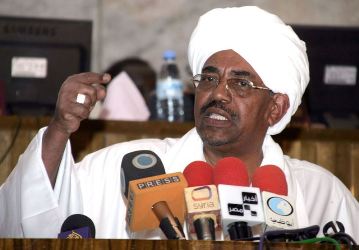Sudan’s Bashir accuses African mediation of manipulating disputed area map
June 16, 2012 (KHARTOUM) – President Omer Al-Bashir rapped the secretariat of the African Union (AU) mediation team saying its members added a new zone to the map of disputed areas without Sudan’s agreement or informing their chairman of this addition.

Speaking before a meeting of the National Shura (consultation) Council of the ruling National Congress Party (NCP), Bashir said Sudan objected to the map prepared by the mediation team in a meeting of the African Union Peace and Security Council (PSC) held in November 2011, because it identifies an areas called ’14 miles’ located south of Bahr Al-Arab or Kiir River as a disputed area.
The president further underscored that despite this objection some African Union officials falsified the position and said that the government of Sudan had accepted this map.
“There are some conspirators at the Secretariat who hid this letter of Sudan’s objection from the chairman of the (African Union High Level) Panel, President (Thabo) Mbeki,” he stressed.
He added that Sudan contested this map in a letter to the United Nations Security Council (UNSC) underlining that the two parties previously agreed on four disputed areas and this fifth area was added by the African mediation without their consent.
“No talk and no negotiation on the security arrangements unless an agreement is reached on the line that separates the two countries in accordance with the borders of 1 January, 1956,” he added.
Bashir announced this position after a statement by the mediation team saying South Sudan has accepted the map it had proposed to the two parties.
It also comes after an announcement by the South Sudanese President Salva Kiir Mayardit saying his country would seek international arbitration on the border disputed areas.
In a statement released this week, Jean Ping, chairman of the commission of the African Union, urged the two parties to enforce the peace and security roadmap reminding they are bound by the decisions of the PSC and by the UNSC acting under Chapter VII.
He also pointed out that the ‘temporary security line’ does not aim to define final status of the boundary between the two countries but to cease hostilities.
Bashir emphasised that Sudan’s delegation will keep negotiating patiently until it gets all the rights for the country.
He also strongly denied any intention of making new concessions after those already made “for the sake of peace and unity” and which resulted in “treachery and treason”, he said.
Bashir criticised the position of the international community saying it did not appreciate the efforts exerted by the Sudan for peace.
He further renewed Sudan’s commitment to UNSC resolution 2046, “even though it equates between the aggressor and the victim” and to settle the security arrangements before anything.
He pointed out that without resolving this issue there will be no peace, no oil transportation, no border monitoring, or four freedoms agreement.
On Thursday following a regular briefing to the UNSC on the situation between the two countries, South Sudanese ambassador to the United Nations (UN), Francis Nazario, told reporters that his country proposed to include all the contested areas in the buffer zone for greater security.
“Demilitarizing all disputed areas would enable the parties to begin final demarcation of the 2,000 kilometre long border in an atmosphere of greater security,” he said.
South Sudan presented a map that adding six new sites to the existing four areas including, Heglig or Panthou, Magenes-Jida, Kafia Kingi, Hafra Nahas, Kaka Tijariya, and Monroe Strip.
(ST)
